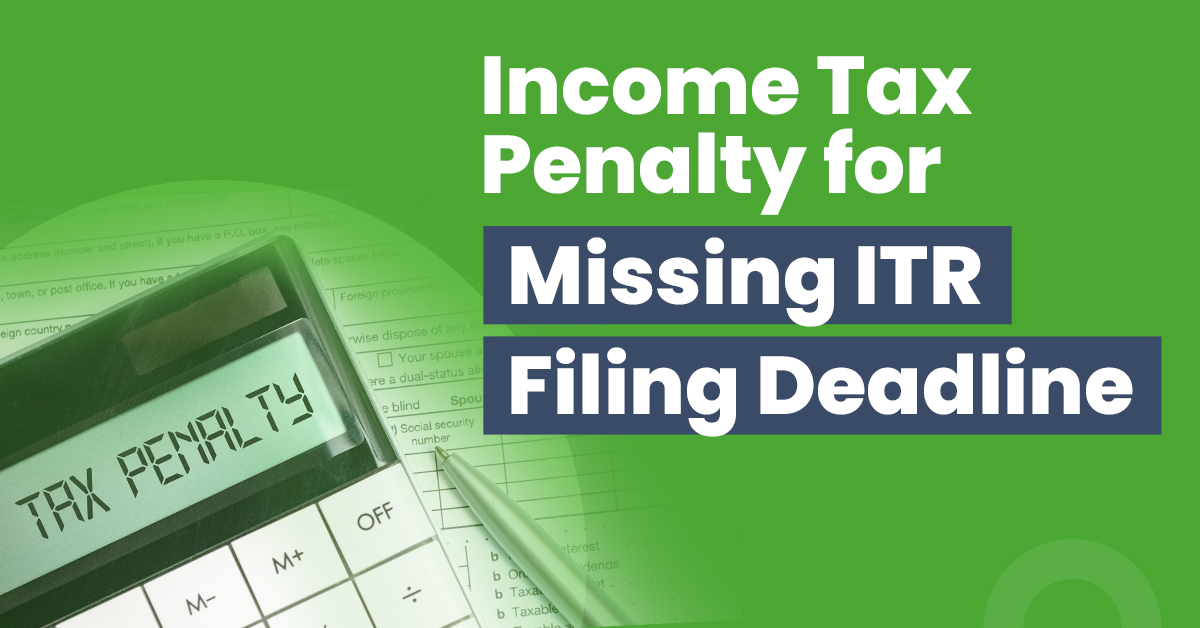What is the Income Tax Penalty for Missing the ITR Filing Deadline?


As a responsible citizen, you should always file your annual income tax return on time. Failure to file your income tax return on time can result in a penalty. Read on to find out more.
ITR Filing for the Year
Income Tax Return (ITR) has to be submitted to the Income Tax Department. ITR shows the information about the tax liabilities of the concerned entity (individual, HUF, AOP, BOI, LPP etc.). The government declares a date by which the ITR must be filed for each financial or assessment year. Failing to file the ITR by its due date can bring an array of consequences in the form of penalty fees and interest payments, along with some other negative implications. But before we discuss the penalties for missing the ITR filing deadlines, let us understand some basic concepts.
Financial Year and Assessment Year
A Financial Year (FY) is the period for which the income and revenues are calculated on an annual basis. It starts on the 1st April of a calendar year and ends on the 31st March of the succeeding calendar year. So, the income earned in the financial year 2021-22 is the income earned during the period from 1st April 2021 to 31st March 2022.
An Assessment Year (AY) is the period in which the income and revenue generated in the corresponding financial year are filed for taxation. The assessment year is the fiscal year in which you file your returns and declare your income for tax purposes. The assessment year for ITR filing of FY 2021-22 would be the following fiscal year. As a result, the assessment year would be 2022-23.
ITR Filing Due Date for AY 2022-23
The deadline for filing ITR for AY 2022-23 (FY 2021-22) is described below.
| Category of Taxpayer | Due Date for Tax Filing- FY 2021-22 (unless extended) |
| Individual / HUF/ AOP/ BOI (Audit is not required) | 31st July 2022 |
| Businesses (Audit is required) | 31st October 2022 |
| Businesses (Requiring Transfer Pricing Report) | 30th November 2022 |
Belated ITR filing with a late fee: If you miss the ITR filing deadline, you can still file a return beyond the due date, in the form of a belated ITR filing. However, you will have to pay a late fee and you will not be able to carry forward the losses for future adjustment. Furthermore, if there is an outstanding tax, the same will attract interest charges as well. The income tax department has now set the deadline for filing the belated return as December 31st of the assessment year (unless further instructions for an extension of the date are given by the government). For this year, you must file the belated income tax return by December 31, 2022.
Income Tax Penalty for Missing the ITR Filing Deadline
If you have missed the due date for filing the ITR, then you may have to bear the following monetary and administrative penalties:
Late fee payment: Under Section 234F of the Income Tax Act, if the ITR has not been filed by the due date, then taxpayers with an annual income of more than Rs. 5 lakh will have to pay a late fee of Rs. 5000. If a taxpayer fails to file his/her ITR even by December 31st of the assessment year, but files it by March 31st of the assessment year, then this late fee may shoot up to Rs. 10,000. If the annual income is less than Rs. 5 lakhs, then one will have to pay a late fee of Rs. 1000 for missing the due date of ITR filing.
Interest payment: If an entity fails to file an ITR by the due date and has outstanding unpaid tax, then it will be charged interest(simple) at the rate of 1% per month on the unpaid outstanding tax amount, starting from the missed due date of ITR filing.
For example if your tax liability is Rs. 10,000 and you pay the amount 3 months after the deadline, then you will have to pay 3% or Rs. 300 as the interest
Loss Adjustment: If you have losses from the stock market, property, mutual funds, or any of your businesses, you can carry them forward and offset them with revenue from the following year. This helps in reducing your tax liability. A loss adjustment is only available if you declare the losses in your ITR and file it before the due date of ITR filing.
Prosecution: If you try to evade taxes by failing to file your ITR, you may also land in jail. The current income tax rules call for a minimum term of 3 months in prison and a maximum sentence of 7 years.
Why is it Important to File ITR in Time?
Filing the ITR on time comes with a wide range of benefits. Some of them are discussed below.
Avoid fines and penalties
By filing your ITR in time you will steer clear of penalties that come with belated or missed ITR filing. Failure to file an ITR by the due date may result in an income tax penalty as high as Rs. 10,000.
Avoid interest charges
Delays in filing ITRs may also result in outstanding unpaid tax amounts. These unpaid amounts attract interest payment of 1% per month under Section 234A of the Income Tax Act.
Guarded against legal action
If you avoid filing ITR to evade taxes then a lawsuit may be filed. By filing your ITR on time, you stay protected against possible legal action.
Easy loan approval
Having a clean record of submitting income tax returns makes it easier to get loans approved from lenders. Banks generally demand for a copy of their ITR statement as proof of income when applying for a loan.
Income tax returns are required for approval of almost every type of loan. Individuals who do not file tax returns may face difficulty obtaining loans from financial institutions.
Carry forward losses
section 139(1) of the Income-tax Act of 1961 contains provisions for carrying over losses from one year to the next. You cannot carry forward or set off the losses if you do not file an income tax return on time.
Tax refund or revision
You can get a tax refund or avail the benefits of the available tax credit if you file your ITR. If you do not file your ITR, you can not claim a tax refund, even if eligible.
Visa approval
An application for a visa is less likely to be denied if it includes ITR documentation. The individual’s tax return is a very important document. Due to growing security concerns, many countries may now require ITR for visas.
Filing ITR is a necessary legal obligation for taxpayers. It is essential for taxpayers to disclose their income and assets in ITR and pay required taxes within the specified deadline. As fellow taxpayers of the country, it is critical that we maintain a close eye on any changes in taxation laws as well as the deadline. Income tax return should be filed within the deadline specified by the government. If missed, it can incur income tax penalties and can result in prosecution of the taxpayer.
FAQs
How to file your income tax return and what happens if you miss it?
You can file your income tax online without any hassle. If you fail to file the return by the due date, you can file a belated return. A late return can be filed by the 31st December of the assessment year. Note that, depending on your annual income, you will have to pay a late fee of Rs. 1000 or Rs. 5000.
What is the due date for filing the return for FY 2021-22 or AY 2022-23 for individuals?
Individuals who are not subject to tax audits must file their income tax returns by July 31, 2022. The deadline for individuals obliged to audit their books of accounts is October 31, 2022.
What is the penalty for late filing of ITR?
According to section 234F of the Income Tax Act, filing the ITR after the due date might result in a late fine of Rs 5,000 for those with an annual income of more than Rs 5 lakh if they do not file their ITR by December 31st of the Assessment Year. If the income is below Rs. 5 lakh then the penalty will be Rs. 1,000.
Can we file a revised ITR after the due date?
Any taxpayer who has already submitted his or her income tax returns may modify and refile them. Even if the return is filed beyond the due date, a revised income tax return can be filed.
How do you fix a mistake in your ITR filing?
If you find an error in your submitted ITR and it has not been processed by the CPC, you can file a revised return. You can use the rectification request feature on the e-Filing site only in response to a CPC order/notice.






